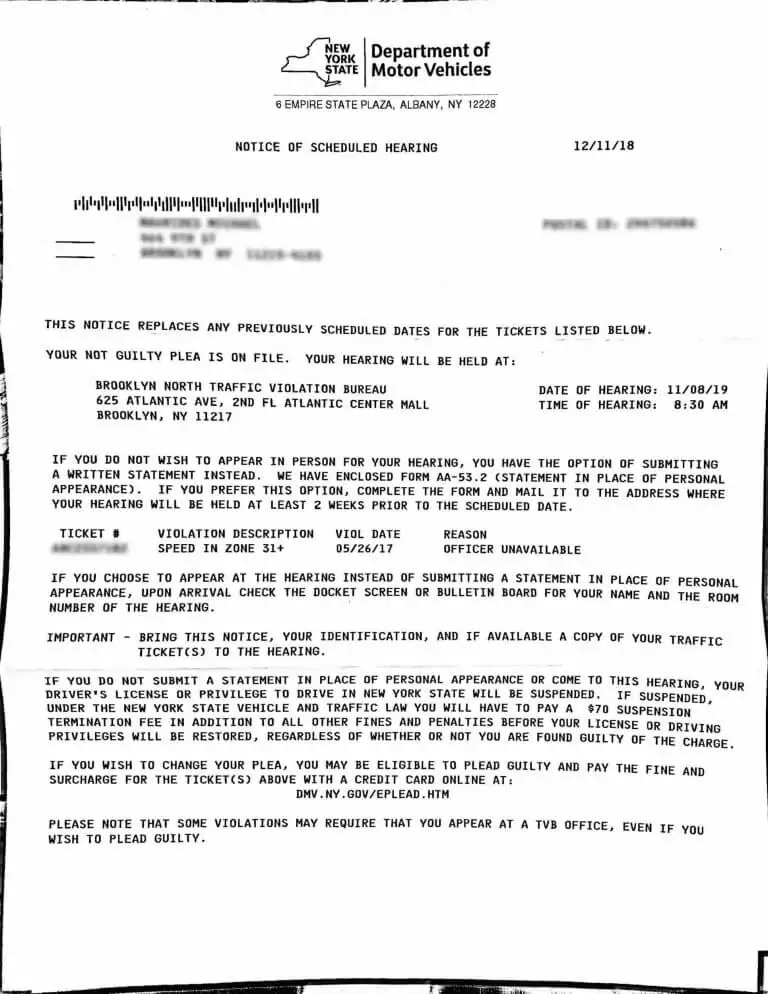
The New York State Department of Motor Vehicles (DMV) is the agency responsible for overseeing the Traffic Violations Bureau. The Traffic Violations Bureau (TVB) handles all the moving violation traffic tickets issued throughout NYC.
When you are issued a traffic ticket in NYC, you have two basic options: plead guilty and accept any points, fines and surcharges that may come with it or plead not guilty and schedule a hearing date when the officer will be called to offer testimony in front of a judge.
If you plead not guilty, you’ll need to decide whether you plan on attending the hearing and representing yourself or plan to hire a New York traffic ticket lawyer to handle your case on your behalf.
If you hire an attorney who regularly handles matters at the TVB, the attorney should have what is commonly called a “vpass” account. This account allows attorneys to “register” as the attorney on a particular case and “associate” this case to the attorney’s vpass account. This system enables attorneys to easily manage their caseload at the TVB. It also enables the TVB to know exactly which defendants are represented by counsel and who that counsel is.
In traditional courts and cases, once an attorney has “appeared” on behalf of the a defendant (“appearance” meaning being designated the attorney of record), any and all court communication will now be directed to the attorney on behalf of the defendant instead of directed to the defendant.
The TVB has rarely acted as a more traditional court might act. They routinely send the same notices and information to defendants with tickets regardless of whether they have an attorney registered and associated with the case. Attorneys have looked the other way because most of these notices are simple updates regarding a scheduled date or an overdue payment rather than more substantive communications regarding the case and one’s defensive strategy.
Unfortunately, the DMV has gone way too far with a letter they’ve recently started sending to people with pending traffic tickets at the TVB.

First page of the DMV’s letter to motorists with traffic violations
The letter, in general, informs the motorist of the currently scheduled hearing date, time and place. Then it goes on to note the following:

The form for submitting the statement simply gives the motorist the chance to write down their version of what happened.
The language is clearly a bit misleading and we feel it is intentional. First, it starts it’s warning regarding possible suspension by stating “if you do not submit a statement”. It could have stated, “if you do not show up in court or submit a statement instead…” This is purposely done to make it appear as if submitting a statement is the more regular course of action and, to those who read it quickly, make it appear as if failure to submit a statement itself may lead to a suspension.
Second, it makes it seem like failure to submit the statement or show in court automatically will lead to a suspension. In fact, a motorist would have 30 days to come in and try to offer an explanation and reschedule before there is any suspension.
While this all may seem as if we are nitpicking a bit, what’s more egregious is what this notice does NOT say.
This letter makes absolutely no mention of the following:
It’s simply a numbers game to the DMV.
We’ve seen hearings done by affidavit. While in court representing motorists, every now and then the judge will stop the regular hearings and do a hearing with just the officer standing in front of him. An affidavit hearing, just like every other hearing, begins with the officer’s testimony regarding why the summons was issued.
In a normal non-affidavit hearing, the motorist (and/or motorist’s lawyer) would then have a review the officer’s notes and ask questions and/or offer testimony that is specifically in response to the officer’s testimony. There can be a back and forth of questions and answers with the officer. Adjustments can be made based on what is in the officer’s notes, what the officer offers as testimony and what the officer has offered in response to any questions asked at the hearing.
In an affidavit hearing, all you are offering in your defense is a statement made before you’ve even heard the details the officer provides. The officer could testify that you were talking on your cell phone with one hand and eating a meatball sandwich with the other hand…and you wouldn’t be there to give your response to any such exaggeration.
These hearings are shorter. These hearings put fewer people in the court who are asking questions, standing in line, arguing with judges, arguing with officers, etc. These hearings result in a higher conviction rate.
As more people are persuaded by the DMV’s aggressively worded letter to mail in an affidavit, the DMV’s overhead involved with holding these hearings goes down and their conviction rate goes up. Basic math to them.
Many people are confused by this letter. We know this for sure because we are getting calls and emails daily from clients who get this communication directly from the DMV despite the fact that they have a lawyer registered with the DMV as working on their case. In some instances, we’ve been registered and working on the case for months by the time the letter comes. Most of our clients who contact us are asking what to do with this letter but some were so certain they needed to send it in that they sent the letter in and had a hearing by affidavit before we even knew!
Think about that for a minute. The DMV/TVB has computer records showing the motorist is represented by an attorney. The DMV nevertheless directly communicates with the motorist without including the attorney in the communication. The DMV invites this motorist via a vaguely threatening letter to basically skip the entire full hearing and have a hearing via a written statement only and this hearing happens without the attorney present or even knowing it happened. This is very, very wrong.
The issues with this letter are exacerbated by the fact that the many traffic violation summonses written in the five boroughs of New York City are written to non-native English speakers more easily scared/swayed by the tenor of the letter or to people who generally don’t have as firm of a grasp of their legal rights in these matters.
Our firm is one of a few who regularly appear in NYC TVB courts and also meet regularly to discuss issues such as these. We’ve all contributed some money to hire our own attorney to help us fight Albany and get this (as well as other DMV/TVB injustices) corrected ASAP.
In the meantime, we encourage anyone who has been issued a ticket in New York City to contact our experienced attorneys at (888) 842-5384 to learn about their legal options or inquire specifically about this affidavit letter if you have any questions.
Many people are confused by this letter. We know this for sure because we are getting calls and emails daily from clients who get this communication directly from the DMV despite the fact that they have a lawyer registeredIf you’ve been issued a traffic ticket in New York, you have the right to fight it. At Feifer & Greenberg, we offer free consultations. That means we’ll discuss the details of your case at no charge to you and help you decide your best course of action. Contact us today to learn more. with the DMV as working on their case. In some instances, we’ve been registered and working on the case for months by the time the letter comes. Most of our clients who contact us are asking what to do with this letter but some were so certain they needed to send it in that they sent the letter in and had a hearing by affidavit before we even knew!
Think about that for a minute. The DMV/TVB has computer records showing the motorist is represented by an attorney. The DMV nevertheless directly communicates with the motorist without including the attorney in the communication. The DMV invites this motorist via a vaguely threatening letter to basically skip the entire full hearing and have a hearing via a written statement only and this hearing happens without the attorney present or even knowing it happened. This is very, very wrong.
The issues with this letter are exacerbated by the fact that the many traffic violation summonses written in the five boroughs of New York City are written to non-native English speakers more easily scared/swayed by the tenor of the letter or to people who generally don’t have as firm of a grasp of their legal rights in these matters.
We have organized a statewide network of attorneys. In our network are both attorneys who work for Feifer & Greenberg and attorneys who work for other firms that regularly provide of-counsel representation to our clients. This statewide network allows us to match clients in a particular county or court with local attorneys who regularly appear on similar matters in the same county or court. It enables us to help clients anywhere in New York State and in our opinion provide particularly effective and affordable representation for our clients. Local attorneys can draw on their particular local experiences and, with travel time and expense removed from the equation, help us keep our legal fees low.
We recommend fighting almost all tickets. Even if the current NY traffic tickets aren’t particularly harmful, you have an incentive to keep your record clean for the future. Convictions quickly lead to surcharges, insurance increases and other complications. You should strongly consider any decision to pay a ticket without fighting.
Our lawyers are experienced, prepared attorneys who understand the nuances of fighting traffic tickets. Experience, preparation and good decision making help us to help our clients avoid points, surcharges, insurance increases and the other negatives that can easily result from a traffic ticket.
Feifer & Greenberg, LLP, 15 Maiden Lane, Suite 508, New York, NY 10038, (888) 842-5384
© 2023 | Privacy Policy